Red Sox Green Team
Air Date: Week of October 5, 2007
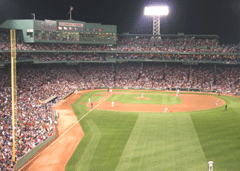
(Photo: Steve Curwood)
The Red Sox have a new five-year initiative to help Boston's beloved Fenway Park go green. With plans on the drawing board for solar panels, a new recycling program, and locally grown produce at the concession stand, the Sox are heating it up. Host Steve Curwood visits Fenway Park to see whether Boston's competitive edge on the field can hold its own in the environmental world.
Transcript
CURWOOD: It may be just about the end of the baseball season, but the other day we got a tip to head over to Fenway Park, the home of our hometown team, the Boston Red Sox. On tap: the opening day of a five-year plan to make Fenway Park more environmentally friendly, starting with something brand new for the BoSox: recycling.
[JAUNTY MUSIC FROM YAWKEY WAY]
CURWOOD: The Red Sox crowd likes to show up early to chow down and drink up, especially hot dogs and beer—make that lots of beer. And when more than 30,000 people party and watch a game under the lights, it takes a lot of electricity. And they create mounds of cans and bottles and cups that could probably cover an entire infield. So how do red-blooded Red Sox fans feel about this being first night for recycling bins at the game?
WOMAN: I think it's great idea. I'm surprised they don't already recycle.
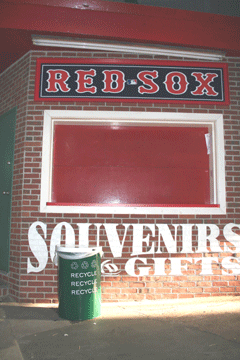
One of forty new recycling bins placed throughout Fenway Park. (Photo: Emily Taylor)
MAN: I think it's a great idea. It’s a good example the Red Sox are showing.
[SOUND OF BAT HITTING BALL, CROWDS]
KIRSCHNER: With this home stand actually tonight we’re starting our recycling program, minimal as compared to how it will be on opening day 2008—it’ll be full scale across the ballpark.
CURWOOD: That’s Katie Kirshcner, the Senior Manager of Business Operations for the Red Sox
KIRSCHNER: We have 40 recycling bins scattered throughout the ballpark telling fans they can recycle their soda and water and bottles in these cans. Next year on 2008 we hope to do our beer cups that we produce quite a few of here at Fenway. We’re taking baby steps now with our recycling program starting tonight and then we’re also—our big off- season project that we are in the process of considering and working on—is solar panels on the roof.
CURWOOD: Recycling. Solar panels. What is it that has suddenly inspired the Red Sox to go as green as their famous short left-field wall known as the Green Monster? Hey, this is sports. So think competition. And while the American League's Red Sox and Cleveland Indians may have tied this year for the best win-loss record in baseball, it turns out that the Indians beat out the Sox on going green by already putting in more than 8,000 watts of solar panels at Jacobs Field.
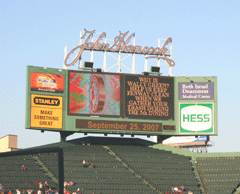
"Why is Wally green? Help us keep Fenway clean when we gather your trash during the 5th inning."(Photo: Steve Curwood)
DEE: This is something we believe in a great deal. We want to be on the cutting edge within professional sports to take the lead on this very important environmental and social issue and we think there's a great opportunity, not only to set the standard for sport facilities, but the standard for the country in taking this under our wing.
CURWOOD: And does Mike Dee think the Red Sox will be carbon neutral in five years?
DEE: (laughs) That's our goal. Nah, I shouldn't say that. We are going to certainly use this—we hope—as a springboard to do other things in the ballpark. We are privileged to have the country's oldest, most-beloved ballpark. In 2012 we are going to be celebrating—for the first time every—the 100th birthday of a sports facility that is still functional—professional sports facility—that is still functional here at Fenway. So wouldn't it be great if that 100 year-old facility led the league in environmental practices and setting the standard for newer facilities to follow.
CURWOOD: For years Fenway Park has mulched their grass clippings to cut down on fertilizer and minimize the use of pesticides. But this new major league effort to go green has been inspired for the most part by the Natural Resources Defense Council in partnership with Major League Baseball, the umbrella organization for pro ball. And beyond recycle bins and solar cells, the NRDC effort encourages clubs to think local when it comes to all that food and drink for the crowd.
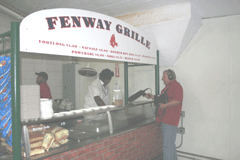
Living on Earth's Jeff Turton lets the hot dogs do the talking. (Photo: Emily Taylor)
HAGGERTY: We ah, extensively shop the local markets for local seafood, produce, bread.
CURWOOD: Kevin Haggerty runs the Fenway food concession for the Aramark Company.
HAGGERTY: We use local hot dogs. Some are made over in Chelsea. But through the summer we had our chefs—in the Premium areas, in the suites—have a very concentrated effort on using local and organic farmers.
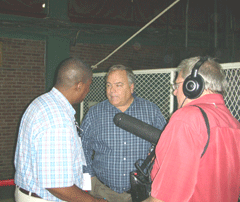
ARAMARK director Kevin Haggerty talks to Steve on the concourse. (Photo: Emily Taylor)
WOMAN: Anything with healthy food is fine with me.
MAN: I agree with her.
MAN: Well, I think it's very good. Anything that helps to promote a better environment is good for everybody in the area. If everybody does that then maybe it makes a difference to the environment.
[SOUND OF CROWDS AND BATS HITTING BALLS]
CURWOOD: And Red Sox Senior Business manager Katie Kirschner was hoping for just that reaction.
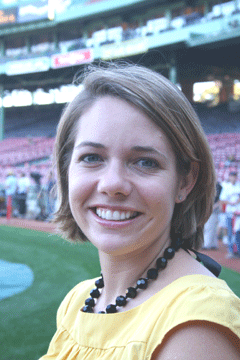
Katie Kirschner (Photo: Emily Taylor)
CURWOOD: So for now, the race is on for the Boston Red Sox. And maybe it's no accident that the competition is fierce for what one might call the "green pennant." Of the four greenest teams in baseball, three of them made it to the playoffs this year, and the fourth is home to the home run king.
[CHEERING FANS; SPORTSCASTER SHOUTING “ . . . THREE NOTHING RED SOX!”]
Links
Living on Earth wants to hear from you!
Living on Earth
62 Calef Highway, Suite 212
Lee, NH 03861
Telephone: 617-287-4121
E-mail: comments@loe.org
Newsletter [Click here]
Donate to Living on Earth!
Living on Earth is an independent media program and relies entirely on contributions from listeners and institutions supporting public service. Please donate now to preserve an independent environmental voice.
NewsletterLiving on Earth offers a weekly delivery of the show's rundown to your mailbox. Sign up for our newsletter today!
 Sailors For The Sea: Be the change you want to sea.
Sailors For The Sea: Be the change you want to sea.
 The Grantham Foundation for the Protection of the Environment: Committed to protecting and improving the health of the global environment.
The Grantham Foundation for the Protection of the Environment: Committed to protecting and improving the health of the global environment.
 Contribute to Living on Earth and receive, as our gift to you, an archival print of one of Mark Seth Lender's extraordinary wildlife photographs. Follow the link to see Mark's current collection of photographs.
Contribute to Living on Earth and receive, as our gift to you, an archival print of one of Mark Seth Lender's extraordinary wildlife photographs. Follow the link to see Mark's current collection of photographs.
 Buy a signed copy of Mark Seth Lender's book Smeagull the Seagull & support Living on Earth
Buy a signed copy of Mark Seth Lender's book Smeagull the Seagull & support Living on Earth

